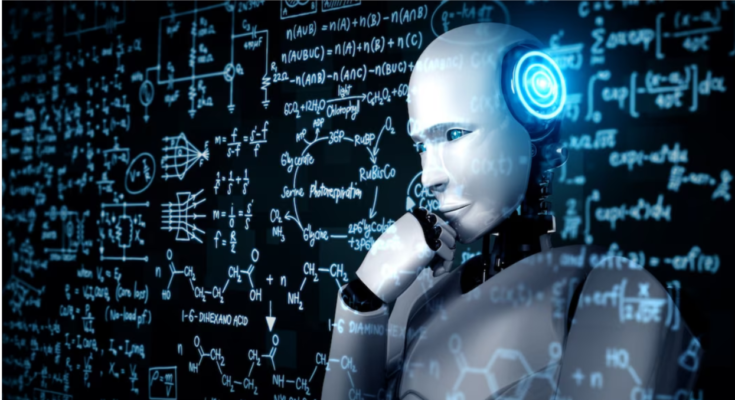A New Digital Frontier
The world of technology is changing fast. The mix of artificial intelligence (AI) and quantum computing is opening up new possibilities. This new combo is changing how we solve problems, analyze data, and think about computing.
As we move towards quantum supremacy, AI’s role in innovation is growing. This is a big moment for AI to explore new areas.
AI and quantum computing are becoming one. This means AI can solve problems that were thought impossible. This team-up is key for many industries, like healthcare, finance, and climate modeling.

Key Takeaways
- The mix of AI and quantum computing is changing the digital world. It opens up new ways to innovate and solve problems.
- Quantum computing’s power can make AI better. This leads to big wins in many fields.
- Together, AI and quantum computing can change many areas. This includes healthcare, finance, and climate modeling.
- Quantum supremacy is important. It shows quantum computers can do more than regular computers.
- The future of quantum AI looks exciting. It will have a big impact on many areas.
Understanding the Convergence of AI and Quantum Computing
The fields of artificial intelligence (AI) and quantum computing are coming together. This is creating a new world of possibilities in computing. At the core of this union is a deep grasp of the basic rules that guide both areas.
Basic Principles of Quantum Computing
Quantum computing is based on superposition and entanglement. Superposition lets quantum bits, or qubits, be in more than one state at once. This is different from classical bits. Entanglement creates a special bond between qubits, letting them affect each other even apart.
The Role of AI in Modern Computing
AI is now a key part of computing, helping with tasks like image recognition and understanding language. AI uses statistical models and learning algorithms to learn from data. It can predict and make decisions on its own.
Integration Points Between AI and Quantum Systems
The joining of AI and quantum computing brings new chances to boost computing power. Quantum algorithms and quantum machine learning can make AI apps better and faster. They can solve problems that classical computers can’t handle.
| Quantum Computing | Artificial Intelligence |
|---|---|
| Superposition and Entanglement | Machine Learning and Statistical Models |
| Quantum Algorithms | Natural Language Processing |
| Quantum Machine Learning | Image Recognition and Computer Vision |
The mix of these two fields is very promising. It could change many industries, like healthcare, finance, and climate modeling. As quantum algorithms and quantum machine learning grow, computing will change. This will open up new areas for innovation and discovery.
The Evolution of Quantum Computing Hardware
The field of quantum computing hardware has seen huge leaps forward in recent years. From the first prototypes to today’s advanced systems, the journey has been both exciting and tough.
At the heart of quantum computing are qubits. These tiny units use quantum mechanics to offer incredible computing power. As scientists work to improve qubits, making quantum hardware bigger and more reliable is key.
- Improvements in qubit design, like superconducting circuits and ion traps, have made quantum systems more stable and easier to control.
- Techniques like quantum error correction codes have helped fix the problem of qubits being fragile. This makes quantum computers more reliable.
- It’s also important to mix classical and quantum computing parts. Classical systems help control and read quantum information.
Big names in quantum computing hardware, like IBM, Google, and D-Wave Systems, have made big steps. They’ve developed bigger quantum processors and pushed the limits of what’s possible. These tech leaders are driving the change in this new technology.
“The growth of quantum computing hardware is more than a tech challenge. It’s a race to explore quantum mechanics fully and change how we compute and store information.”
The search for quantum supremacy keeps the field of quantum computing hardware exciting and fast-changing. It promises to open up new areas in computing and change how we solve complex problems.

Artificial Intelligence in the Age of Quantum Computing
The digital world is changing fast. Now, artificial intelligence (AI) and quantum computing are coming together. This new mix is going to change everything we thought was possible.
Current State of AI Technologies
AI has done amazing things, but it still has its limits. It struggles with speed, handling data, and using energy wisely. But, quantum computing is about to change all that.
Quantum computers use quantum mechanics to solve problems faster and more accurately. They will help us make big strides in healthcare and understanding the climate.
Quantum Enhancement of AI Capabilities
Quantum computers are great at optimization, simulation, and learning. When we mix quantum hardware with AI, we get something new. This mix will help us solve complex problems faster.
For example, quantum neural networks can learn and work much quicker. This is just the beginning of how AI and quantum computing will change the world.
Future Perspectives and Predictions
As quantum computing gets better, AI and quantum tech will make huge leaps. We’ll see AI solve problems that seemed impossible before. This includes finding new medicines and understanding the climate better.
The future looks exciting. Quantum AI could change industries, solve big global problems, and expand our knowledge. It’s a thrilling time for technology.
“The convergence of AI and quantum computing will redefine the limits of what’s possible, ushering in a new era of technological innovation and discovery.”

Quantum Algorithms and Machine Learning Integration
The lines between quantum computing and artificial intelligence are getting closer. Quantum algorithms, like Grover’s search and Shor’s factorization, are changing how we process data and recognize patterns. This is a big deal for machine learning.
Grover’s algorithm makes finding patterns in big datasets much faster. This could make machine learning tasks, like recognizing images and understanding language, way more efficient. Shor’s algorithm, meanwhile, is a game-changer for keeping data safe. It’s crucial for many AI applications.
Quantum algorithms and machine learning together do more than just speed up computing. They open up new ways to analyze data. This could lead to major breakthroughs in drug discovery, materials science, and understanding the climate.
As we keep working on combining quantum algorithms and machine learning, we’re getting closer to solving big problems. The future of quantum AI looks bright. It’s going to change many areas of our lives.

“The intersection of quantum computing and machine learning is poised to unlock a new era of computational power, ushering in a wave of innovations that could fundamentally reshape our world.”
Quantum Neural Networks: Revolutionizing Deep Learning
A new chapter in artificial intelligence is unfolding. Quantum computing is merging with neural networks. This fusion, known as quantum neural networks, promises to change deep learning forever. It opens up new possibilities and boosts our computing abilities.
Architecture of Quantum Neural Networks
Quantum neural networks use quantum mechanics for better computing. They are more efficient and work in parallel. This is different from traditional computers.
These networks use quantum properties like superposition and entanglement. This helps them process information and make decisions faster. They are designed to work with quantum algorithms and hardware, leading to better performance in tasks like image recognition and language processing.
Training Methods and Optimization
Training quantum neural networks is a unique challenge. Specialized techniques are needed to make the most of quantum properties. Researchers have come up with new training algorithms.
These algorithms use quantum phenomena like quantum annealing. They help networks learn faster and more accurately. This is changing how we train and optimize neural networks, making them more efficient and accurate.
Real-world Applications
The field of quantum neural networks is growing fast. It has many uses in different fields. In healthcare, it can improve drug discovery and genetic analysis.
In finance, it can help with portfolio optimization and fraud detection. Quantum neural networks also have potential in solving complex problems like climate modeling and cryptography. They could lead to groundbreaking solutions to global challenges.

The combination of artificial intelligence and quantum computing is a major breakthrough. As quantum neural networks advance, we’ll see a new era of computing. This will make the impossible possible and shape our future.
Quantum Cryptography and AI Security
The digital world is changing fast, with quantum computing and AI coming together. Quantum computers are getting very powerful, making old encryption methods weak. The Quantum cryptography uses quantum mechanics to keep data safe.
Quantum cryptography is a new way to protect information. It uses quantum states to make strong encryption keys. This method can keep data safe from even the most advanced cyber attacks.
AI helps make quantum cryptography even better. Machine learning can make these systems more efficient and secure. This mix of quantum cryptography and AI is a big step forward in keeping our digital world safe.
As quantum computing grows, we need better security. Quantum cryptography and AI together are a strong defense. They help us face new cybersecurity challenges and make our digital future safer.
“The future of cybersecurity lies in the seamless integration of quantum cryptography and AI-driven security solutions.”
Practical Applications Across Industries
Artificial intelligence (AI) and quantum computing are changing how we work. They’re making big waves in healthcare, finance, and more. These new techs are helping us solve tough problems faster and better.
Healthcare and Drug Discovery
In healthcare, quantum computing is changing drug making. It lets scientists test how molecules work in new ways. This means finding new medicines faster and cheaper.
Financial Services
Finance is also getting a boost from quantum computing. It helps with complex financial models. This means better risk management and smarter investments.
Climate Modeling and Environmental Protection
Quantum computing is key for climate and environment work. It helps scientists understand our climate better. This leads to better plans to fight climate change.
AI and quantum computing are opening up new possibilities. They’re changing healthcare, finance, and climate work. Together, they’re making us more efficient and accurate in solving big problems.
| Industry | Quantum Computing Applications |
|---|---|
| Healthcare and Drug Discovery | Simulating molecular and protein behavior Accelerating the identification of potential drug candidates Expediting the development of life-saving treatments |
| Financial Services | Optimizing complex financial models Enhancing risk assessment and portfolio optimization Improving trading strategies and decision-making |
| Climate Modeling and Environmental Protection | Simulating climate systems for more accurate predictions Informing decision-making for effective climate change mitigation Enhancing environmental data analysis for targeted conservation efforts |
“The convergence of AI and quantum computing is unlocking a new frontier of innovation, empowering us to tackle some of the most complex challenges facing our world.”
Challenges and Limitations in Implementation
As we explore quantum computing, many challenges and limitations arise. These quantum computing challenges go beyond just technology. They include issues like scalability, stability, and the need for specialized skills.
One big problem is the instability of qubits. These are the basic units of quantum computers. Keeping qubits in a stable quantum state is hard. Even a small disturbance can cause errors and mess up the calculations. Researchers are working hard to improve qubit stability and lower error rates.
Scalability is another big challenge. As more qubits are added, the system gets much more complex. It’s hard to manage and keep large quantum systems running smoothly. Finding efficient ways to handle big quantum systems is a top priority for scientists and engineers.
| Challenge | Description | Potential Impact |
|---|---|---|
| Qubit Stability | Maintaining the delicate quantum state of qubits | Disrupts computational accuracy and reliability |
| Scalability | Increasing the number of qubits while managing complexity | Limits the practical applications of quantum computing |
| Specialized Skills | Requirement for highly trained professionals in quantum physics and programming | Hinders widespread adoption and commercialization |
Also, we need a team with skills in quantum physics, math, and computer science. The gap between research and real-world use is big. There aren’t enough experts yet.
But, the benefits of quantum computing are too great to ignore. People are working hard to solve these problems. They aim to make quantum computing a reality, bringing new AI and innovations to many fields.
Future Roadmap for Quantum AI Development
The blend of artificial intelligence (AI) and quantum computing is set to change the game. This fusion could lead to huge leaps in many fields. Think healthcare, finance, climate science, and protecting our environment.
Research Priorities
Researchers are working hard on several key areas. They aim to:
- Make quantum algorithms better for learning and data analysis
- Make quantum computers more reliable and scalable
- Find new ways to use quantum in neural networks and deep learning
- Boost AI security with quantum cryptography and safe protocols
Industry Collaborations
Big tech, research centers, and startups are teaming up. These partnerships are key for sharing knowledge and speeding up quantum AI progress. We’re already seeing big moves in this direction.
Timeline Predictions
Experts say we’ll hit major quantum AI milestones in the next decade. In 5-10 years, we’ll see quantum AI in action in specific areas. Then, it will start to become part of everyday AI systems.
By the 2030s, quantum AI could change industries and our views on what’s possible. This is the future of artificial intelligence in the age of quantum computing.
“The future of artificial intelligence is inextricably linked to the advancements in quantum computing. Together, they hold the power to solve some of the most complex challenges facing humanity.”
Conclusion
Artificial intelligence (AI) and quantum computing are coming together, opening a new digital frontier. This mix of technologies could change how we compute, analyze data, and solve problems. It’s a big leap forward.
We’ve looked at the basics of quantum computing and how AI is changing computing today. We’ve seen how these two are merging, creating new possibilities. This includes advancements in quantum hardware and algorithms, and how they work with machine learning.
Looking ahead, AI and quantum computing could lead to major breakthroughs. These could be in healthcare, finding new drugs, improving financial services, and protecting the environment. But, we face challenges like figuring out how to use these technologies and overcoming current limitations.
FAQ
What is the convergence of artificial intelligence and quantum computing?
Artificial intelligence (AI) and quantum computing are coming together in a big way. This new mix is changing how we use technology. It’s all about making AI better with quantum computing’s power.
What are the basic principles of quantum computing?
Quantum computing works on two main ideas: superposition and entanglement. These let quantum computers do things regular computers can’t. They help create new ways to solve problems and learn.
How does AI integrate with quantum computing systems?
AI is key in today’s tech world. It connects well with quantum systems. This mix can make AI better at handling data and making decisions.
What are the current challenges in quantum computing hardware development?
Making quantum computers is tough. They need stable qubits, low error rates, and to grow bigger. Solving these problems is essential for quantum computing to become common.
How can quantum computing enhance AI capabilities?
Quantum computing can change AI for the better. It can speed up learning and data analysis. This means AI could get smarter and more accurate.
What is the role of quantum algorithms in machine learning integration?
Quantum algorithms, like Grover’s search, can boost AI. They help with data and pattern recognition. This mix could lead to big breakthroughs in many areas.
What are the key features of quantum neural networks?
Quantum neural networks are different from regular ones. They use quantum tricks to learn faster and better. This could change how we solve complex problems.
How does quantum cryptography impact AI security?
Quantum computers can be a threat to security, but they also offer a solution. Quantum cryptography can protect data better. AI can help make these systems even safer.
What are the practical applications of AI-enhanced quantum computing across industries?
AI and quantum computing together can change many fields. They can help find new medicines, improve finance, and better understand the climate. This is a big deal for many industries.
What are the current challenges and limitations in implementing AI-powered quantum computing systems?
Using AI and quantum computing together is hard. It needs stable qubits, low errors, and more. But, scientists are working hard to solve these problems.
What is the future roadmap for quantum AI development?
The future of quantum AI looks bright. There are big goals and plans for how to get there. It could change our world in many ways.



